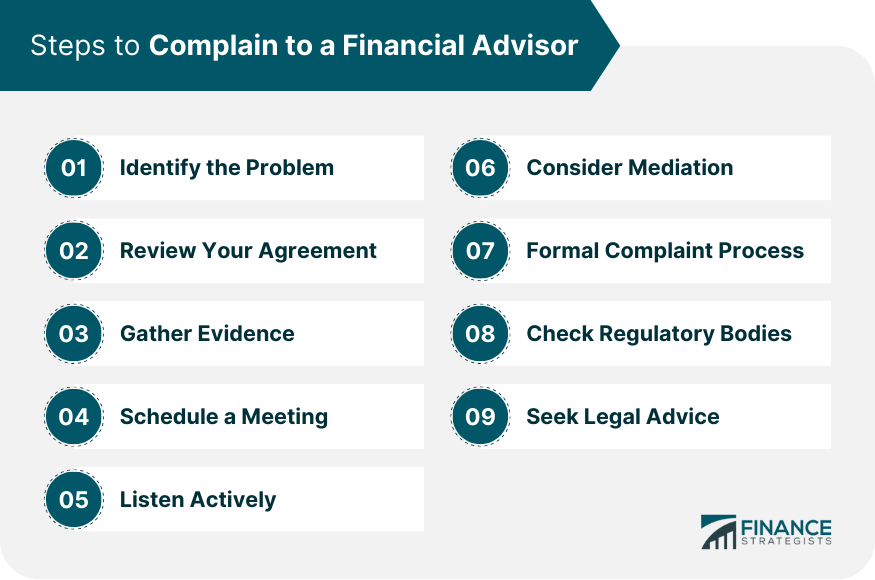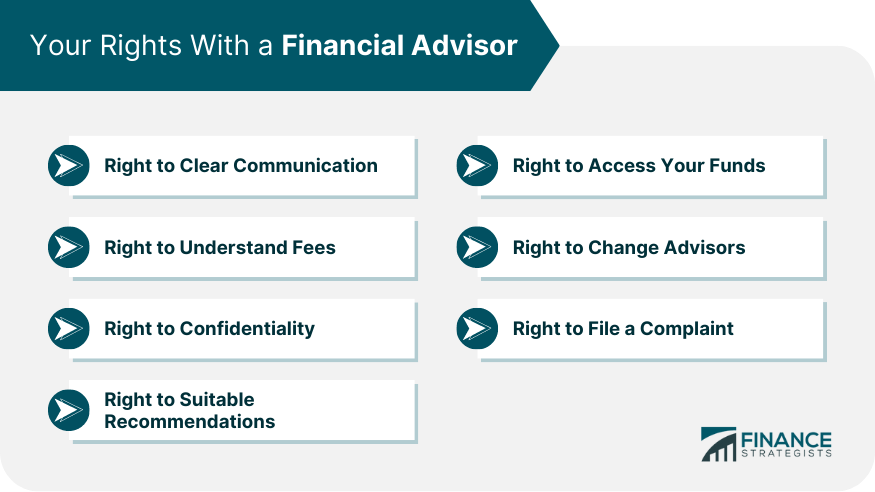Financial advisors play a pivotal role in shaping your financial future. Entrusting someone with your hard-earned money is a significant leap of faith, and it's crucial to have open channels of communication. Not only do they provide expert insights into your investments, but they also act as gatekeepers, ensuring your wealth is preserved and grows over time. Addressing concerns and potential disagreements promptly and effectively ensures a mutually beneficial relationship between the advisor and the client. Having a transparent relationship based on trust is paramount in the financial world. Unfortunately, there can be moments when disagreements or concerns arise. Whether it's a perceived mismanagement of funds, an unclear fee structure, or a series of poor communication exchanges, it's essential to know how to navigate such concerns. Before you proceed with any complaint, it's essential to be clear about what's bothering you. This could be a matter of miscommunication, unexpected fees, or a dissatisfaction with how your investments are being handled. Reflect on whether the issue stems from unmet expectations or if there's a genuine discrepancy in the services provided. By having a precise idea of the problem, you can communicate more effectively with your financial advisor and pinpoint the core of the issue. Revisit the service agreement or contract you signed initially with the advisor. Familiarize yourself with the terms, especially focusing on your agreed services, fees, and any conflict resolution mechanisms. Knowing your rights and obligations from the agreement can provide a foundation for your complaints. It also aids in ensuring that you're not misconstruing any terms or conditions, thereby making your concerns more valid and grounded. This means collecting all relevant communication, be it email threads, physical letters, financial statements, or even personal notes from meetings. Mark out specific dates, instances, and the nature of each concern. Having a well-documented record not only strengthens your position but also allows your advisor to revisit specific instances. This can lead to more constructive conversations and quicker resolutions. Once you're equipped with information, approach your advisor for a discussion. A face-to-face meeting is usually best as it facilitates clear and direct communication. During these unprecedented times, even a video call can bridge the gap better than an email. When setting up the meeting, ensure you let them know you have concerns you'd like to address. This gives them a heads-up and allows them to prepare, ensuring a productive conversation. After presenting your concerns, give your advisor a chance to explain. They might offer a different perspective or provide information you hadn't considered. Active listening involves genuinely hearing them out and trying to understand their viewpoint. A two-way dialogue can sometimes clear up misunderstandings faster than anticipated. Be open to their feedback and seek clarification where needed. If direct communication doesn't resolve the issue, consider suggesting a third-party mediator. This neutral party can help both you and the advisor see each other's points of view and find common ground. Mediation often provides a platform where both parties feel heard, leading to mutually beneficial resolutions. It's a step towards compromise without escalating the issue. If personal communication or mediation doesn't lead to a resolution, it might be time to initiate a formal complaint with the advisor's firm. Each firm will have its process, so be sure to gather the necessary information and follow the steps outlined. While a formal complaint might seem confrontational, it's a structured way to ensure your concerns get the necessary attention and are addressed appropriately. In cases where you suspect unethical behavior or misconduct; it might be appropriate to file a complaint with the relevant financial regulatory body in your jurisdiction. In the U.S., this might be the Securities and Exchange Commission (SEC). They ensure professionals adhere to industry standards and can investigate any deviations. While this step is more severe, it ensures that any major breaches of trust or professional misconduct are adequately addressed, maintaining the industry's integrity. If all else fails, or if you believe there has been a significant breach of trust or legal obligation, consulting with an attorney becomes essential. They can provide clarity on your rights and potential courses of action. While legal routes can be time-consuming and expensive, in some cases, they may be the only way to ensure your interests are protected and justice is served. When you engage the services of a financial advisor, you are not just seeking their expertise in managing your finances. You are also entering into a professional relationship that comes with specific rights and obligations for both parties. Recognizing and understanding these rights is crucial to ensure that you get the best service possible and that your interests are always prioritized. At the heart of any advisory relationship is open and transparent communication. You have the right to receive clear explanations about the investment strategies being recommended, the risks involved, and any potential costs. Regular updates about your portfolio, market conditions, and any changes in strategy should also be provided. Furthermore, any questions or concerns you may have should be addressed promptly and thoroughly. Financial advisors are compensated for their services, but how they are paid can vary. Whether it's through commissions, flat fees, or a percentage of assets managed, you have the right to a clear breakdown of these fees. Any additional costs, like transaction fees or service charges, should also be transparently conveyed. Moreover, there should never be any hidden fees. Every expense that comes out of your pocket needs to be justified and agreed upon. Your financial situation, investment goals, and personal information are private. When sharing this information with an advisor, you have the right to expect complete confidentiality. Financial professionals are bound by strict privacy regulations to ensure your data is protected and not shared without your explicit consent. This right not only protects your financial details but also ensures that personal data like your Social Security Number or other identification details remain safe. When a financial advisor offers advice or recommends specific financial products, they should align with your financial goals, risk tolerance, and overall financial situation. This means that the advice should be tailored to you and not influenced by external factors like commissions or bonuses. The concept of "fiduciary duty" means that the advisor must act in your best interest, placing your needs above their own or their firm's profits. Your money remains yours, even when it's invested. Thus, you have the right to access your funds, subject to any agreed-upon terms or conditions of specific investments. This also means that you can add or withdraw funds, switch investment products, or make other changes as needed. While certain investments might have withdrawal penalties or time restrictions, these should be clearly communicated to you from the onset. If you're unsatisfied with the service, communication, or performance of your advisor, you have the right to seek a different advisor. Whether it's within the same firm or moving to a new one, the choice of who handles your finances ultimately rests with you. This transition should be smooth, and any transfer of funds or assets should occur without unnecessary delays or undue charges. If you believe that your advisor has acted unethically, incompetently, or against your best interests, you have the right to file a complaint. This can be with their supervising firm, a regulatory body, or in severe cases, through legal channels. Understanding the complaint process, timelines, and potential outcomes can be essential in ensuring your voice is heard and any discrepancies are addressed. Financial advisors hold a vital role in shaping individuals' financial futures. Addressing concerns promptly fosters a mutually beneficial partnership. To address issues effectively, follow a structured approach. Identify the problem clearly, review your agreement for foundational understanding, and gather evidence for a well-supported position. Engage in open dialogue during a face-to-face meeting, embracing active listening and seeking a compromise. When necessary, consider mediation to find common ground. Formal complaint processes and regulatory bodies offer avenues for resolution, maintaining the industry's integrity. Legal advice can be sought as a last resort. Recognizing your rights as a client is pivotal: clear communication, understanding of fees, confidentiality, suitable recommendations, access to funds, changing advisors, and the right to file complaints. Upholding these rights ensures a balanced, effective, and trusted advisory relationship.Role of a Financial Advisor
How to Complain to a Financial Advisor
Identify the Problem
Review Your Agreement
Gather Evidence
Schedule a Meeting
Listen Actively
Consider Mediation
Formal Complaint Process
Check Regulatory Bodies
Seek Legal Advice

Understanding Your Rights With a Financial Advisor
Right to Clear Communication
Right to Understand Fees
Right to Confidentiality
Right to Suitable Recommendations
Right to Access Your Funds
Right to Change Advisors
Right to File a Complaint

Conclusion
How to Complain to a Financial Advisor? FAQs
To effectively complain to a financial advisor, start by identifying the issue, gathering evidence, and reviewing your agreement. Schedule a face-to-face meeting to discuss your concerns, actively listen to their perspective, and consider mediation if needed.
Addressing concerns with a financial advisor is crucial for maintaining a healthy advisory relationship. It ensures that your financial goals are met, misunderstandings are clarified, and potential issues are resolved promptly, fostering trust and transparency.
A financial advisor plays a pivotal role in guiding your financial journey. They provide expert insights, manage investments, and help preserve and grow your wealth over time. Their role extends to offering suitable recommendations, aligning strategies with your goals, and ensuring financial security.
When working with a financial advisor, you have several rights. These include the right to clear communication, understandable fee structures, confidentiality of personal information, suitable recommendations aligned with your goals, access to your funds, the option to change advisors, and the right to file a complaint if needed.
Balancing your rights and responsibilities when complaining to a financial advisor involves understanding your contractual obligations as well. You have the responsibility to provide accurate information and communicate openly. In return, you have the right to voice concerns, seek clarification, and expect transparent, ethical, and tailored advice in line with your financial objectives.
True Tamplin is a published author, public speaker, CEO of UpDigital, and founder of Finance Strategists.
True is a Certified Educator in Personal Finance (CEPF®), author of The Handy Financial Ratios Guide, a member of the Society for Advancing Business Editing and Writing, contributes to his financial education site, Finance Strategists, and has spoken to various financial communities such as the CFA Institute, as well as university students like his Alma mater, Biola University, where he received a bachelor of science in business and data analytics.
To learn more about True, visit his personal website or view his author profiles on Amazon, Nasdaq and Forbes.











